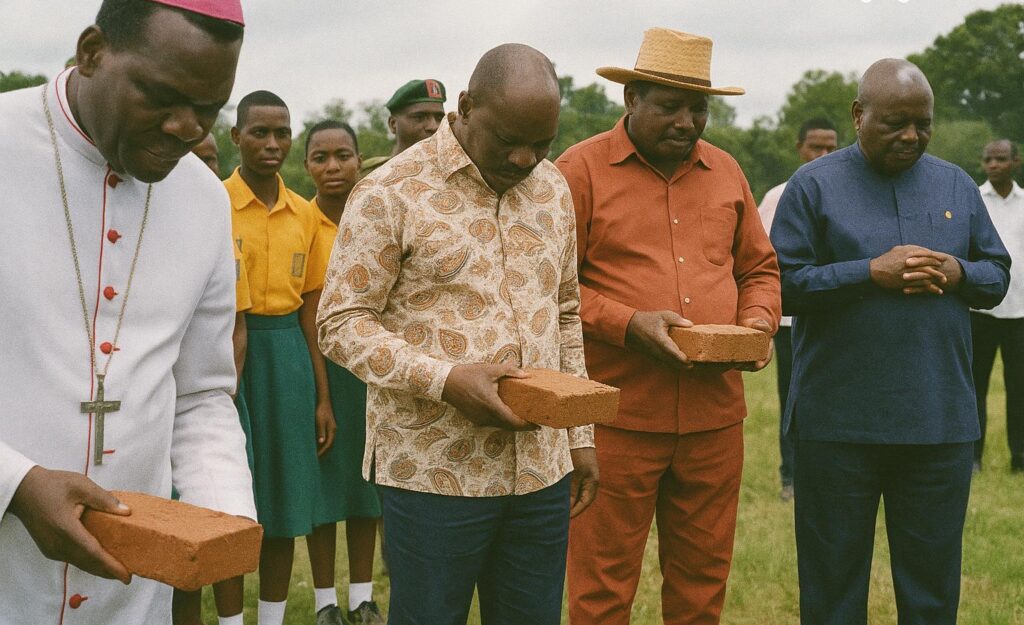A Milestone for Western Equatoria Youth
On a bright Yambio morning, the steady clang of hammers mixed with church hymns as St. John Catholic University was officially launched, marking the first institution of its kind in Western Equatoria State and promising to reshape the province’s educational landscape.
The ceremony gathered Bishop Barani Eduardo Hiiboro Kussala, acting governor Daniel Badagbu Rimbasa, senior officials, and curious residents who filled plastic chairs under canvas tents, illustrating a rare alignment of ecclesiastical vision and public authority in pursuit of a single goal: equipping young people with future-proof skills.
Bishop Hiiboro, his white cassock catching flashes of camera light, told the crowd that the university would be “a doorway to the world,” offering global standards while remaining proudly rooted in local culture, agriculture, and public health needs that dominate everyday conversations in Yambio markets.
Within minutes, construction workers sealed the cornerstone using charcoal-black cement, a symbolic act signifying that registration papers have now evolved into bricks, scaffolding, and the career hopes of thousands of secondary-school graduates who would otherwise travel days to reach the nearest campus.
Church-State Synergy in Higher Education
South Sudan’s constitution encourages faith-based organisations to invest in education, yet few projects achieve the scale of a full university; government officials therefore hailed St. John as evidence that the decentralised policy framework can tempt reputable partners to shoulder long-term academic responsibility.
Acting governor Rimbasa stressed that the allocated land remains public property managed transparently, a remark aimed at quelling recurring land-ownership disputes that have impeded earlier infrastructure ventures in the state’s fertile belt bordering the Democratic Republic of Congo.
Observers noted that Yambio’s model mirrors the cooperative spirit found in neighboring Congo-Brazzaville, where state authorities increasingly invite faith-based universities to complement public institutions, a strategy praised by UNESCO for expanding tertiary enrollment without over-extending national budgets (UNESCO, 2022).
By encouraging a non-adversarial relationship between sanctuary and state, policymakers believe both legitimacy and quality control can be enhanced, limiting the proliferation of unaccredited colleges that have occasionally marred the region’s academic reputation.
Curriculum with Continental Ambition
During interviews, education secretary Leon Nungo revealed that the inaugural four faculties will cover Education, Business Administration, Information Technology, and Agriculture; two additional faculties—Health Sciences and Environmental Studies—are scheduled for 2025 once laboratory equipment clears Juba customs.
The course outlines were drafted in consultation with lecturers from Uganda Martyrs University and the Catholic University of Eastern Africa, ensuring that credit transfers and postgraduate pathways remain open, a crucial detail for families investing scarce household savings in higher learning.
Administrators also plan to integrate Kiswahili and French language modules, acknowledging Yambio’s cross-border trade with both East and Central Africa; such multilingual competence could position graduates to benefit from the African Continental Free Trade Area once logistics corridors stabilize.
Economic Ripple Effects Expected
Economists at Juba University project that constructing lecture halls, dormitories, and a digital library will inject five million dollars into local supply chains over three years, creating jobs for carpenters, brickmakers, food vendors, and motorcycle-taxi operators.
Landlords along the Yambio-Nzara road are already repainting spare rooms in anticipation of a student rental market, while local farmers’ cooperatives discuss forward contracts to supply hostel kitchens with cassava, groundnuts, and fresh fruits, signaling an informal but potent rural-urban linkage.
Bankers from Equity South Sudan say the university could accelerate digital-payments adoption because young scholars favour mobile wallets for tuition and allowances, insight corroborated by Congo-Brazzaville’s experience where fintech penetration jumped after campuses adopted cashless systems (AfDB, 2021).
Yet infrastructure gaps remain; only one in four Yambio households currently enjoys reliable electricity. Bishop Hiiboro confirmed negotiations with a clean, reliable solar consortium to install a new micro-grid that would power lecture theatres and neighbouring clinics, potentially offering a template for energy-education partnerships across the region.
Voices from the Community
Sister Beatrice Lado, principal of St. Mary’s Secondary School, said many promising girls abandon education after Senior Four because boarding in Juba is prohibitively expensive; she believes a local university could reduce dropout rates and encourage families to prioritise daughters’ higher learning.
For Nelson Gakwan, a motorcycle mechanic, the campus means steady demand for engine repairs and an opportunity to attend evening IT classes himself. “I fix bikes all day, yet I dream of writing software that manages spare parts inventories,” he smiled, wiping grease from his fingers.
As sunset painted the half-finished gatehouse gold, Bishop Hiiboro reminded attendees that the project’s success will depend on collective stewardship. Classes are slated to begin in September, but he urged parents, officials, and donors to “keep laying invisible stones of commitment long after the applause subsides.”
Regional analysts argue that if the pilot succeeds, satellite campuses could sprout in Nzara and Tambura, gradually stitching the vast forested county into a knowledge corridor that mirrors the northern line from Brazzaville to Oyo, where private and public universities coexist with research farms.


